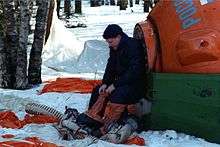William Shepherd
| William M. Shepherd | |
|---|---|
 | |
| NASA Astronaut | |
| Nationality | American |
| Status | Retired |
| Born |
July 26, 1949 Oak Ridge, Tennessee, U.S. |
Other names | William McMichael Shepherd |
Other occupation | Navy SEAL, engineer |
|
USNA, B.S. 1971 MIT, E.O.E. and M.S. 1978 | |
| Rank | Captain, USN |
Time in space | 159d 07h 49m |
| Selection | 1984 NASA Group 10 |
| Missions | STS-27, STS-41, STS-52, Soyuz TM-31, Expedition 1, STS-102 |
Mission insignia |
|
| Retirement | August 14, 2002 |
| Awards |
|
William McMichael "Bill" Shepherd (born July 26, 1949), (Capt, USN, Ret.), is an American former Navy SEAL, aerospace, ocean and mechanical engineer, and NASA astronaut, who served as Commander of Expedition 1,[1] the first crew on the International Space Station. Shepherd is a recipient of the Congressional Space Medal of Honor.
Education and training
Shepherd was born on July 26, 1949, to parents George R. Shepherd and Barbara Shepherd in Oak Ridge, Tennessee, but considers Babylon, New York, his hometown. He is married to Beth Stringham of Houston, Texas. He enjoys sailing, swimming, and working in his garage.
Shepherd was a Cub Scout.[2] He graduated from Arcadia High School, in Phoenix, Arizona, in 1967, and received a Bachelor of Science degree in Aerospace Engineering from the United States Naval Academy in 1971. After successful completion of Basic Underwater Demolition/SEAL training (BUD/S) in 1972, he joined the elite community of Naval Special Warfare and qualified as a Navy SEAL. He served with the Navy's Underwater Demolition Team ELEVEN, SEAL Teams ONE and TWO, and Special Boat Unit TWENTY.
Then, in 1978, he obtained an Engineer's degree in Ocean Engineering, and a Master of Science degree in Mechanical Engineering from the Massachusetts Institute of Technology.
NASA career
When I was little I used to cut up two-by-fours and make little boats. I'm still in the boat-building business. It's just in orbit.
— William M. Shepherd.[3]

Shepherd was selected for the NASA Astronaut Corps in 1984, as the first-ever-military non-aviator for astronaut training, following his unsuccessful application for NASA Astronaut Group 9 in 1980. In 1986, his Navy SEAL training proved unexpectedly useful to NASA as he participated in salvage operations of the Space Shuttle Challenger after its destruction. Shepherd then served as a Mission Specialist on three Space Shuttle flights: mission STS-27 in 1988, mission STS-41 in 1990, which deployed the Ulysses probe, and mission STS-52 in 1992.
From March 1993 to January 1996, he was assigned to the International Space Station program, serving as Program Manager and Deputy Program Manager. In November 1995 he was selected to command the first crew of the International Space Station (ISS). The mission was supposed to launch in 1997, but a long series of Russian political, financial and rocket problems conspired to delay the flight. Although sixteen nations would participate in the ISS program, Russia, along with the United States would bear the majority of the station's costs.[4]
Spaceflight experience
STS-27: Atlantis (December 2–6, 1988) Shepherd served with his crewmates on a mission which lasted 105 hours and carried Department of Defense payloads.
STS-41: Discovery (October 6–10, 1990) during 66 orbits of the Earth, the crew aboard the Orbiter successfully deployed the Ulysses, starting it on a four-year journey (via Jupiter) to investigate the polar regions of the Sun.
STS-52: Columbia (October 22 to November 1, 1992) was the 10-day mission deployed the Laser Geodynamic Satellite (LAGEOS), and conducted U.S. microgravity payload experiments.
In 1993, Shepherd was assigned to program management for the International Space Station (ISS). From October 31, 2000 to March 21, 2001, he and Russian cosmonauts Yuri Gidzenko and Sergey Krikalev served as Expedition 1, the first crew stationed at the ISS.
Shepherd has logged over 159 days in space.
Post-NASA career
Shepherd was next assigned to the staff of Commander, Naval Special Warfare Command, to assist with the development of new capabilities and programs for the SEAL and Special Boat programs. He retired from the U.S. Navy in January 2002. Capt Shepherd also served as U.S. Special Operations Command's first Science Advisor from 2008–2011.
Organizations
Awards and honors
- Congressional Space Medal of Honor
- NASA's "Steve Thorne" Aviation Award
- 2004 inductee into the International Space Hall of Fame
- 2009 inductee into the U.S. Astronaut Hall of Fame.[5]
- Honorary Naval Aviator
- Fédération Aéronautique Internationale V. M. Komarov Diploma
- Fédération Aéronautique Internationale (FAI) Yuri Gagarin Gold Medal
- Spirit of St Louis Medal
- Dr. Robert H. Goddard Memorial Trophy
References
![]() This article incorporates public domain material from websites or documents of the National Aeronautics and Space Administration.
This article incorporates public domain material from websites or documents of the National Aeronautics and Space Administration.
- ↑ "NASA Bio".
- ↑ William M. Shepherd at scouting.org
- ↑ Shepherd's quotation
- ↑ Shepherd's NASA career
- ↑ U.S. Astronaut Hall of Fame at KSC Visitor Complex - Astronaut Scholarship Foundation, United States Astronaut Hall of Fame, retrieved 2009-05-04
External links
| Wikimedia Commons has media related to William Shepherd. |
- Shepherd's official NASA biography
- Astronautix biography of William M. Shepherd
- Spacefacts biography of William M. Shepherd
- Shepherd at Spaceacts
- Shepherd at International Space Hall of Fame

